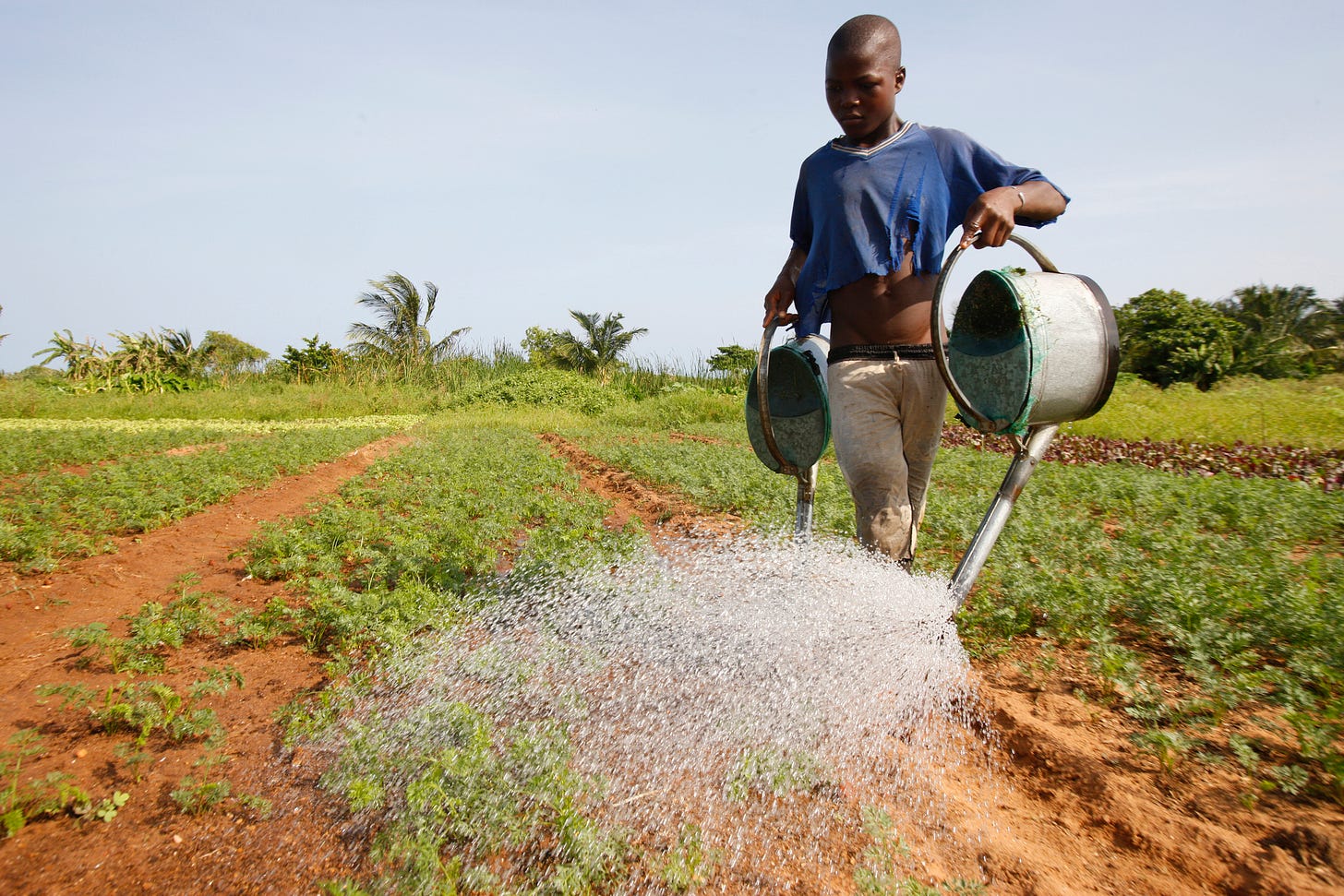The Taste of Climate Change
How drought, unsustainable farming practices, and conflict are affecting diets in Togo
I’m taking a much-needed break this week so this issue of Thin Ink is guest written by a journalist from Togo, who is experiencing the impacts of climate change directly on his plate.
Thin’s pickings will also be on hiatus until I’m back.
Jean Sovon is a Togolese journalist who is passionate about human rights, governance, environmental rights, and climate justice in Africa. He is the regional editor for French-speaking Africa, researcher and media trainer for Global Voices.
I first realised the importance of using spices in 2011 when my mom, rest her soul, suffered her first stroke. Very quickly, her new eating habits became those of all her children: less salt, less sugar, less oil, but much more natural and organic spices in our meals.
Born into a polygamous family of 14 children, our father had six wives. I'm the second of my mother's four children. In most polygamous families in Africa, each wife is responsible for the education and, above all, the nutrition of her children.
Before her stroke, my mother used different kinds of bouillon cubes to flavour the dishes she prepared for us.
Although these products are dangerous for human health - according to a May 2021 study [in French] by researchers from the Niger Chambers of Agriculture Network and cited in this BBC Afrique article, some cubes are full of chemicals - they are not banned from the market.
So the family's new eating habits - following our mother's illness and the advice of doctors - emphasise the use of spices in their natural state: onion, ginger, garlic, cloves, cinnamon, turmeric and many others.
The abundant blend of the first three spices - onion, ginger and garlic - is a worthy substitute for all those stock cubes. In those days, you didn't have to spend a lot of money to get a large quantity of these different spices. Little by little, we - my brothers and I - have all kept this habit. Each of us lives with his or her own small family, and this tradition, started by our mother, lives on.
Today, I'm discovering that ginger and onion are two ingredients that go into the preparation of most of the food eaten by over 9 million Togolese. Togo is a small country in West Africa, with a surface area of nearly 57,000 square kilometres, less than half of the size of New York State. It borders Ghana (west), Benin (east), Burkina-Faso (north) and the Atlantic Ocean to the south.
Ginger plays a very important role in Togolese cuisine, it is prized for its pungent flavour, which brings a warm characteristic to meals. It is also appreciated for its ability to aid digestion and stimulate the immune system.
Onions also play a central role in our country's cuisine. It is recognised as the aromatic base of most traditional Togo dishes.
The use of a good quantity of ginger and onion mixed with garlic gives an original, aromatic taste to food. With awareness raising campaigns that began in the 2010s to inform households about the dangers of bouillon cubes, many households have replaces them with this mixture.
Awareness of the need to use natural products was raised by groups involved in the promotion and consumption of local products, such as the Organisation pour l'Alimentation et le Développement Local (OADEL), a Togolese organisation that promotes the use of these spices among the population.
Also, in local restaurants promoting traditional foods, you can easily taste these spices in the dishes.
But over the past six months or so, we've been forced to spend much more than usual on ginger and onions to continue eating healthily. This is due to the increase in their market prices.
The economic impact of the Covid19 health crisis is still being felt in the African economy, and Togo has not been spared.
Populations are struggling to get back on their feet, and an economic crisis that began last year continues to affect all aspects of life and impacted all social strata in Togo until today. Today, it is the source of the high cost of living in our country.
The country is experiencing soaring prices for basic necessities including ginger and onion. At the market I go to, the price of a bowl of ginger, which stood at 2,000 FCFA ($3.50) at the start of 2024, has soared to 10,000 FCFA ($17.50) in June 2025. As for onions, a bag of onions is now almost 65,000 FCFA ($114.13) from 20,000 FCFA ($35.12).
The main reasons given are the scarcity of rainfall to stimulate the cultivation and productivity of these ingredients. The Togolese population is therefore bearing the full brunt of the indirect consequences of climate change.
Like every country in the world, my beloved Togo is also affected by climate change. In fact, the local media are doing their utmost to raise awareness and encourage communities to play their part in mitigating or slowing the advance of this phenomenon.
But as we all know, Africa pollutes less, but it is Africa that suffers the serious damage caused by rising greenhouse gas emissions and environmental pollution.
The impacts of climate change, manifested in flooding, prolonged drought and coastal erosion, are palpable across the country, especially on public health and agriculture. In remote areas, where the majority of crops are grown, we watch helplessly as crops are lost. This state of affairs makes the rural populations who depend solely on these agricultural activities even more vulnerable.
In particular, the 2024 harvests have not withstood the absence of rain. In Atakpamé, a town located in the Plateaux region of Togo, I meet Abla, a ginger farmer who shared with me her disappointment with the 2024 harvest.
"The ginger did not produce up to expectations. Not only did it not rain at the right time, but also certain insects or parasites devoured the few plants that did. This is the first time (this has happened),” she told me.
Normally, she collects between 250 and 350 bags, each weighing 50 kilos. But this year, she only had 150 bags.
Abla's situation is identical to that of many other farmers in other parts of the country.
However, in addition to the scarcity or even absence of rainfall, onion production in Togo has also been affected by farming practices that overuse chemical fertilisers, according to an agricultural expert I spoke to. The Savanes region in the north of the country is where onions are grown and it is usually women who are at the forefront of this activity.
In times of disruption, Togo imports ginger from other countries in the West African sub-region, notably Nigeria, to meet consumer demand. Unfortunately, a diplomatic crisis in the region has led to the closure of the Nigeria-Niger border and the Nigeria-Benin border. This means traders who manage to pass through tortuous routes and incurred extra expenses - taxes, customs, rackets - have to raise prices.
To ensure the availability of onions throughout the year, Togo imports onions from Niger and Burkina-Faso. These imports don't amount to much, considering that Niger supplies onions to several countries in the West African sub-region. But this regional shortfall means that West African countries, and de facto Togo, are generally dependent on imports from East Asia.
This shortage will change the eating habits of the Togolese because not everyone can afford to put healthy, naturally well-flavoured meals on their plates. Those without sufficient means end up going back to using bouillon cubes while those who can end up paying a fortune to be able to eat healthily every day. Good food costs more than it used to.
In addition to the devastating effects of climate change, which are making it difficult to grow ginger and onions in our country, there are other, no lesser, factors at play which are driving up prices.
The countries of the central Sahel region, notably Niger, Mali and Burkina Faso, have been facing terrorist threats and armed conflicts for over a decade. These terrorists have taken up positions in strategic areas, destabilising farmers in their agricultural activities. They also intervene in border areas to control goods in transit. This has the direct consequence of closing the borders these countries share with other countries.
It's clear that climate change will make life harder around the world, and even harder in the countries of the South. Bad weather, floods, droughts and heatwaves have a devastating impact on our lives. In 2024, several West African countries suffered flooding, with disastrous and humanitarian consequences for their populations.
African countries are at the crossroads of climate challenges, and urgent action is needed to save what can still be saved in terms of food security. Otherwise, the continent's food future will be on the dotted line.
As always, please feel free to share this post and send tips and thoughts on bluesky @thinink.bsky.social, mastodon @ThinInk@journa.host, my LinkedIn page, twitter @thinink, or via e-mail thin@thin-ink.net.





